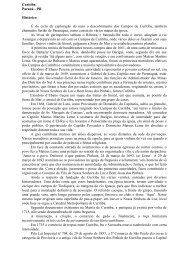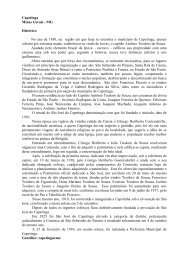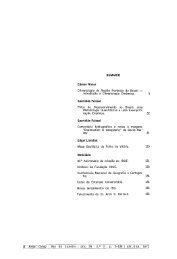- Page 1 and 2: & estudos ANÁLISES Documentação
- Page 3 and 4: Presidente da República Luiz Inác
- Page 5 and 6: Instituto Brasileiro de Geografi a
- Page 7 and 8: 6 Historiografi a de um objeto mult
- Page 9 and 10: a presentação O Instituto Brasile
- Page 11 and 12: Nas três últimas décadas, mundo
- Page 13 and 14: uso de diferentes referências teó
- Page 15 and 16: próprias de pesquisas, que, ainda
- Page 17 and 18: Pinto de Oliveira (demógrafo) e Al
- Page 19 and 20: tautológica, que essa separação
- Page 21: Frohmann (também canadense) 1 . Su
- Page 25 and 26: para isso de sua experiência como
- Page 27 and 28: tempos históricos: o de “estatí
- Page 29 and 30: estatística tem sido feita nos ou
- Page 31 and 32: das estatísticas públicas. O olha
- Page 33 and 34: uniformização técnica) quanto pe
- Page 35 and 36: Parte 1 Abordagens historiográfi c
- Page 37 and 38: Estatísticas nas américas l’obj
- Page 39 and 40: Estatísticas nas américas de la q
- Page 41 and 42: Estatísticas nas américas récemm
- Page 43 and 44: La nationalisation statistique (184
- Page 45 and 46: Estatísticas nas américas en moin
- Page 47 and 48: Estatísticas nas américas in the
- Page 49 and 50: Estatísticas nas américas machine
- Page 51 and 52: La statistique dans un contexte de
- Page 53 and 54: Estatísticas nas américas Dans le
- Page 55 and 56: Estatísticas nas américas de rest
- Page 57 and 58: Estatísticas nas américas la popu
- Page 59 and 60: Estatísticas nas américas à sati
- Page 61 and 62: Estatísticas nas américas Coats,
- Page 63 and 64: Régime pré et proto statistique 1
- Page 65 and 66: Resumen: La historia de la estadís
- Page 67 and 68: Estatísticas nas américas poblaci
- Page 69 and 70: Estatísticas nas américas asumier
- Page 71 and 72: Estatísticas nas américas Paralel
- Page 73 and 74:
Estatísticas nas américas esos au
- Page 75 and 76:
Estatísticas nas américas como a
- Page 77 and 78:
Estatísticas nas américas Lahitte
- Page 79 and 80:
Estatísticas nas américas La hist
- Page 81 and 82:
Estatísticas nas américas naciona
- Page 83 and 84:
Estatísticas nas américas Por úl
- Page 85 and 86:
Estatísticas nas américas El car
- Page 87 and 88:
Bibliografía: Estatísticas nas am
- Page 89 and 90:
Estatísticas nas américas GONZALE
- Page 91 and 92:
Estatísticas nas américas OTERO,
- Page 93 and 94:
Resumen: 3 La elite estadística y
- Page 95 and 96:
Estatísticas nas américas Posguer
- Page 97 and 98:
Estatísticas nas américas recurso
- Page 99 and 100:
Estatísticas nas américas Entonce
- Page 101 and 102:
Estatísticas nas américas que den
- Page 103 and 104:
Estatísticas nas américas distint
- Page 105 and 106:
Estatísticas nas américas e infor
- Page 107 and 108:
Estatísticas nas américas de Cere
- Page 109 and 110:
Estatísticas nas américas LO QUE
- Page 111 and 112:
Estatísticas nas américas cohabit
- Page 113 and 114:
Estatísticas nas américas montaro
- Page 115 and 116:
Estatísticas nas américas La quin
- Page 117 and 118:
Estatísticas nas américas perdier
- Page 119 and 120:
Estatísticas nas américas con la
- Page 121 and 122:
V. Bibliografía citada Estatístic
- Page 123 and 124:
Estatísticas nas américas OSZLAK,
- Page 125 and 126:
Estatísticas nas américas políti
- Page 127 and 128:
Estatísticas nas américas intelec
- Page 129 and 130:
3. 4. Estatísticas nas américas i
- Page 131 and 132:
Estatísticas nas américas entonce
- Page 133 and 134:
Estatísticas nas américas de clas
- Page 135 and 136:
Estatísticas nas américas De este
- Page 137 and 138:
Estatísticas nas américas una for
- Page 139 and 140:
Estatísticas nas américas OTERO,
- Page 141 and 142:
Estatísticas nas américas dessa f
- Page 143 and 144:
Estatísticas nas américas (é o c
- Page 145 and 146:
Estatísticas nas américas em 1848
- Page 147 and 148:
*** Estatísticas nas américas No
- Page 149 and 150:
Estatísticas nas américas constru
- Page 151 and 152:
Estatísticas nas américas amostra
- Page 153 and 154:
Estatísticas nas américas brasile
- Page 155 and 156:
Resumo 6 Historiografia de um objet
- Page 157 and 158:
Estatísticas nas américas Chaunu
- Page 159 and 160:
Estatísticas nas américas element
- Page 161 and 162:
Estatísticas nas américas A unifi
- Page 163 and 164:
Estatísticas nas américas ante o
- Page 165 and 166:
Estatísticas nas américas “meio
- Page 167 and 168:
Estatísticas nas américas com ida
- Page 169 and 170:
Estatísticas nas américas constit
- Page 171 and 172:
Estatísticas nas américas SENRA,
- Page 173 and 174:
Resumen: 7 Las estadísticas ofi ci
- Page 175 and 176:
Estatísticas nas américas mitad d
- Page 177 and 178:
Estatísticas nas américas en espe
- Page 179 and 180:
Estatísticas nas américas solapad
- Page 181 and 182:
Estatísticas nas américas tareas
- Page 183 and 184:
Estatísticas nas américas La pren
- Page 185 and 186:
Estatísticas nas américas los fon
- Page 187 and 188:
Estatísticas nas américas de tabu
- Page 189 and 190:
Estatísticas nas américas El sect
- Page 191 and 192:
Estatísticas nas américas reanuda
- Page 193 and 194:
Estatísticas nas américas En el p
- Page 195 and 196:
Estatísticas nas américas DERE. P
- Page 197 and 198:
Estatísticas nas américas PREBISC
- Page 199 and 200:
Estatísticas nas américas conjunt
- Page 201 and 202:
Estatísticas nas américas governa
- Page 203 and 204:
Estatísticas nas américas desempe
- Page 205 and 206:
Resumo 9 Síntese da ‘História d
- Page 207 and 208:
*** Estatísticas nas américas Ess
- Page 209 and 210:
Estatísticas nas américas desider
- Page 211 and 212:
Estatísticas nas américas institu
- Page 213 and 214:
Estatísticas nas américas Um estu
- Page 215 and 216:
Estatísticas nas américas que as
- Page 217 and 218:
Estatísticas nas américas publica
- Page 219 and 220:
Palavras fi nais Estatísticas nas
- Page 221 and 222:
Estatísticas nas américas “rend
- Page 223 and 224:
Estatísticas nas américas Sobre e
- Page 225 and 226:
Estatísticas nas américas também
- Page 227 and 228:
Estatísticas nas américas de fato
- Page 229 and 230:
Estatísticas nas américas educar
- Page 231 and 232:
Estatísticas nas américas escravi
- Page 233 and 234:
Estatísticas nas américas Não ob
- Page 235 and 236:
Estatísticas nas américas tivesse
- Page 237 and 238:
Estatísticas nas américas a prest
- Page 239 and 240:
Estatísticas nas américas passam
- Page 241 and 242:
Estatísticas nas américas Evident
- Page 243 and 244:
Estatísticas nas américas de reve
- Page 245 and 246:
Estatísticas nas américas sem sus
- Page 247 and 248:
Estatísticas nas américas ou téc
- Page 249 and 250:
Estatísticas nas américas Na leit
- Page 251 and 252:
Estatísticas nas américas A funç
- Page 253 and 254:
Estatísticas nas américas CARDOSO
- Page 255 and 256:
Resumo: 11 Censos nacionais brasile
- Page 257 and 258:
Estatísticas nas américas que tan
- Page 259 and 260:
Estatísticas nas américas para pr
- Page 261 and 262:
Estatísticas nas américas casamen
- Page 263 and 264:
Estatísticas nas américas O mater
- Page 265 and 266:
A Primeira República e o censo de
- Page 267 and 268:
Estatísticas nas américas As List
- Page 269 and 270:
Estatísticas nas américas Neste p
- Page 271 and 272:
Estatísticas nas américas das dua
- Page 273 and 274:
Estatísticas nas américas a sess
- Page 275 and 276:
Estatísticas nas américas argumen
- Page 277 and 278:
Estatísticas nas américas NEWELL,
- Page 279 and 280:
Resumen Los censos en el siglo XVII
- Page 281 and 282:
Estatísticas nas américas las aut
- Page 283 and 284:
9. poder planear estrategias polít
- Page 285 and 286:
Las razones que se dieron son las s
- Page 287 and 288:
Estatísticas nas américas Otro de
- Page 289 and 290:
Estatísticas nas américas despué
- Page 291 and 292:
Estatísticas nas américas de mort
- Page 293 and 294:
Estatísticas nas américas En Madr
- Page 295 and 296:
Estatísticas nas américas era muc
- Page 297 and 298:
Estatísticas nas américas en aque
- Page 299 and 300:
Estatísticas nas américas Hacking
- Page 301 and 302:
Estatísticas nas américas y se co
- Page 303 and 304:
Estatísticas nas américas Un deba
- Page 305 and 306:
Estatísticas nas américas y poco
- Page 307 and 308:
Estatísticas nas américas “qué
- Page 309 and 310:
Estatísticas nas américas que de
- Page 311 and 312:
Estatísticas nas américas sucesiv
- Page 313 and 314:
Estatísticas nas américas contrar
- Page 315 and 316:
Estatísticas nas américas JIMÉNE
- Page 317 and 318:
Parte 4 Como seguir adiante?
- Page 319 and 320:
Estatísticas nas américas junto
- Page 321 and 322:
Estatísticas nas américas de uma
- Page 323 and 324:
Estatísticas nas américas discurs
- Page 325 and 326:
Estatísticas nas américas avalia
- Page 327 and 328:
Estatísticas nas américas o desre
- Page 329 and 330:
Bibliografi a Estatísticas nas am
- Page 331 and 332:
Estatísticas nas américas A razã
- Page 333 and 334:
Estatísticas nas américas elas so
- Page 335 and 336:
Estatísticas nas américas mais ac
- Page 337 and 338:
Estatísticas nas américas O IBGE
- Page 339 and 340:
Resumo: Introdução 16 As estatís
- Page 341 and 342:
Estatísticas nas américas Dados o
- Page 343 and 344:
Estatísticas nas américas de part
- Page 345 and 346:
Estatísticas nas américas países
- Page 347 and 348:
Estatísticas nas américas PAIVA,
- Page 349 and 350:
Estatísticas nas américas demanda
- Page 351 and 352:
Estatísticas nas américas Hemos i
- Page 353 and 354:
Estatísticas nas américas sobre s
- Page 355 and 356:
Estatísticas nas américas Por otr
- Page 357 and 358:
Parte 5 Trajetórias Intelectuais
- Page 359 and 360:
Estatísticas nas américas opção
- Page 361 and 362:
Estatísticas nas américas ponto d
- Page 363 and 364:
Estatísticas nas américas como su
- Page 365 and 366:
Estatísticas nas américas estos d
- Page 367 and 368:
Estatísticas nas américas de la h
- Page 369 and 370:
Estatísticas nas américas A pesar
- Page 371 and 372:
Estatísticas nas américas públic
- Page 373 and 374:
Estatísticas nas américas El caso
- Page 375 and 376:
Estatísticas nas américas consoli
- Page 377 and 378:
Bibliografía 1 Estatísticas nas a
- Page 379 and 380:
Entrevista com Jean-Pierre Beaud, p
- Page 381 and 382:
Estatísticas nas américas la micr
- Page 383 and 384:
Estatísticas nas américas associa
- Page 385 and 386:
Estatísticas nas américas semblai
- Page 387 and 388:
Estatísticas nas américas des sta
- Page 389 and 390:
Estatísticas nas américas toute u
- Page 391 and 392:
12) La historia de la estadística
- Page 393 and 394:
Estatísticas nas américas L’Èr
- Page 395 and 396:
Estatísticas nas américas History
- Page 397 and 398:
Estatísticas nas américas changes
- Page 399 and 400:
Estatísticas nas américas of the
- Page 401 and 402:
Estatísticas nas américas ordinar
- Page 403 and 404:
Alexandre de Paiva Rio CAMARGO Esta
- Page 405 and 406:
Equipe técnica Projeto Editorial C



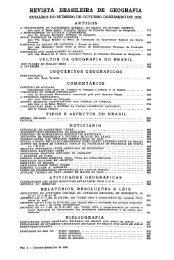
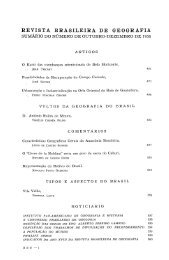



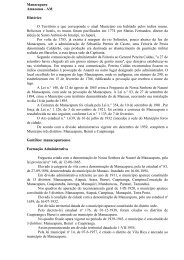
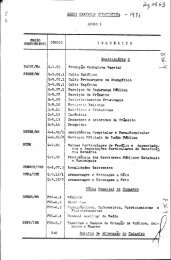
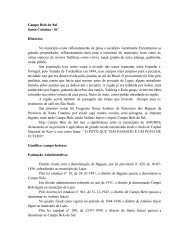
![Manual de Estatística [Fillippo Virgillii] - Biblioteca do IBGE](https://img.yumpu.com/17097551/1/185x260/manual-de-estatistica-fillippo-virgillii-biblioteca-do-ibge.jpg?quality=85)

